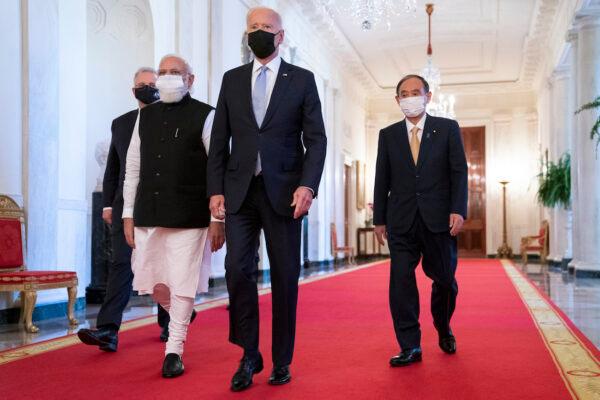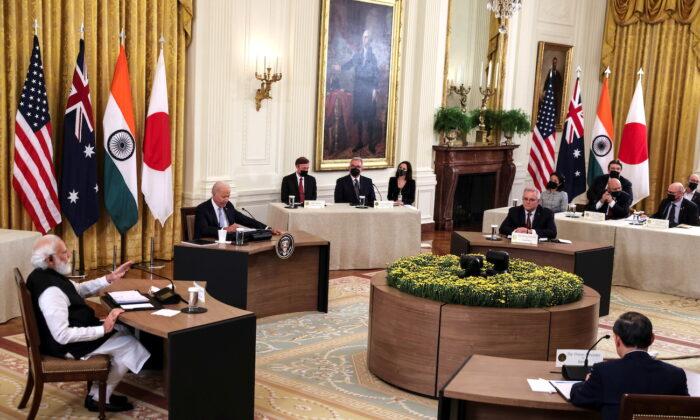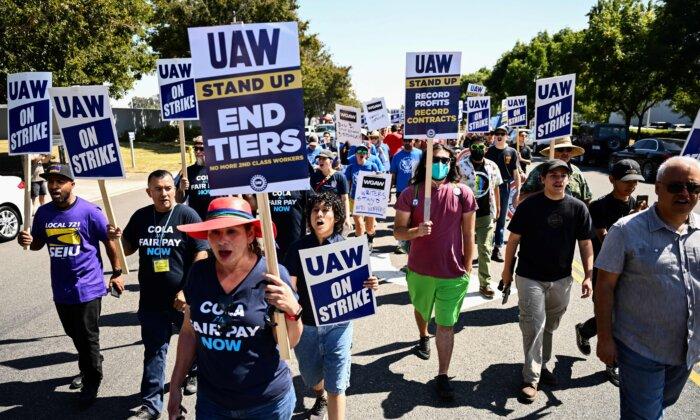Leaders of the United States, Australia, India, and Japan, released a lengthy joint statement on Friday, in part declaring their commitment to a “free and open Indo-Pacific” that is “undaunted by coercion” amid continued efforts from communist China to wrestle influence over the globe.
The Quad was originally established in 2007 and has periodically met since. The strategic dialogue between the democratic countries is widely viewed as a response to communist China’s rising economic and military power.
“On this historic occasion we recommit to our partnership, and to a region that is a bedrock of our shared security and prosperity—a free and open Indo-Pacific, which is also inclusive and resilient,” reads the statement from President Joe Biden, Australian Prime Minister Scott Morrison, Indian Prime Minister Narendra Modi and Japanese Prime Minister Yoshihide Suga.

“Together, we recommit to promoting the free, open, rules-based order, rooted in international law and undaunted by coercion, to bolster security and prosperity in the Indo-Pacific and beyond,” they said. “We stand for the rule of law, freedom of navigation and overflight, peaceful resolution of disputes, democratic values, and territorial integrity of states. We commit to work together and with a range of partners.”
Suga told reporters after the meeting that the leaders “frankly discussed issues ranging from the coronavirus pandemic, climate change, new technology and other regional issues affecting the Indo-Pacific region.” He said the Quad meeting was “a very meaningful meeting for the four countries and our cooperation in order to achieve the free and open Indo-Pacific.”
Securing the Indo-Pacific
The leaders pledged in the joint statement that they would “continue to champion adherence to international law ... to meet challenges to the maritime rules-based order, including in the East and South China Seas.” They voiced support for small island states, ”especially those in the Pacific,“ to ”enhance their economic and environmental resilience.”The Chinese Communist Party (CCP) has in recent years increased its military presence in the South China Sea and claimed sovereignty over some areas in the East China Sea over which Japan is administering. Suga raised concerns over the CCP’s intentions in the region, reported the AP.
The Quad leaders also urged for the complete denuclearization of North Korea and called for the country to “engage in substantive dialogue” over its nuclear weapons and ballistic missile programs.
Critical Materials
Separately, Quad leaders said that their respective nations are mapping the supply chain of critical technologies and materials, including for semiconductors. They also recognized the importance of government support measures and policies in this field.One point from the guide reads, “Technology should not be misused or abused for malicious activities such as authoritarian surveillance and oppression, for terrorist purposes, or to disseminate disinformation.”
COVID-19 pandemic
The Quad had met virtually earlier this year in March and formed the Quad Vaccine Partnership, pledging to donate at least 1 billion doses of the COVID-19 vaccine globally by the end of 2022 in efforts to combat the pandemic. The joint statement said that efforts to that end continue and that to date, nearly 79 million doses of COVID-19 have been delivered to Indo-Pacific nations under those commitments.Quad leaders said they welcome India’s announcement to resume export of COVID-19 vaccines, including to the worldwide COVAX program, starting in October 2021. India had banned exports in April amid a spike in COVID-19 cases in the country. Modi said that it is prepared to export some 8 million COVID-19 vaccine doses, India’s foreign secretary said.





